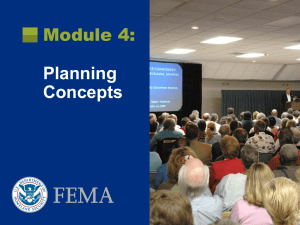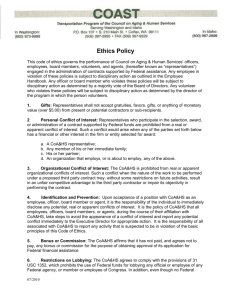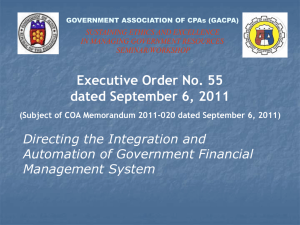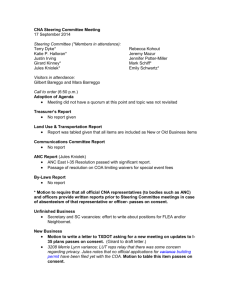Cost of Living
advertisement
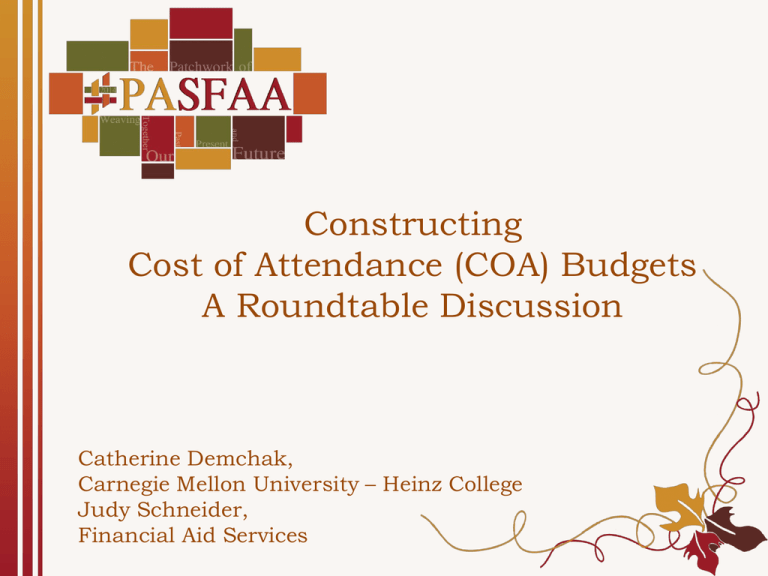
Constructing Cost of Attendance (COA) Budgets A Roundtable Discussion Catherine Demchak, Carnegie Mellon University – Heinz College Judy Schneider, Financial Aid Services Talking points… What is a Cost of Attendance (COA) Budget? What should be included? Where do I start? How many different COAs are needed? How often do I need to update the COA? What is a Cost of Attendance (COA) Budget? The cost of attendance (COA) is the foundation for establishing a student’s financial need. It sets a limit on the total aid that a student may receive for purposes of… Pell Grant Calculations TEACH Grant Campus-Based Programs Direct Subsidized and Unsubsidized Loans Direct PLUS/Graduate PLUS Loans The costs that you establish for your students will be used to calculate their Federal Student Aid award amounts and package their aid. What should be included? The COA should include… Direct Costs, (costs paid to the university): Tuition Fees Health Insurance Indirect Costs, (costs associated with attending school): Books and Supplies (laptops, cameras, notebooks, software, etc…) Room and Board Transportation Personal Expenses Loan fees (Some colleges differentiate costs for state residents vs. nonresidents.) What should be included? On a case-by-case basis you may want to adjust the COA for expense such as, Dependent Care (child, spouse and/or elder care) Study Abroad Expenses Disability Expenses Other Education-Related Expenses Always be sure to collect documentation for any additional expense added to your established COA. Where do I start? Review COAs of schools in your area Contact their financial aid office to inquire about their methods for determining living expenses Use cost of living estimators CollegeBoard living expense costs by region Talk to your program directors Estimates of books and supplies Survey your students Housing and miscellaneous costs Where do I start? College Board http://professionals.collegeboard.com/highered/financial-aid/living-expense Where do I start? College Board http://professionals.collegeboard.com/higher-ed/financialaid/living-expense The base budgets for 2014-15 are: Moderate (Prevailing) Budgets 12 Month $23,010 9 Month $17,260 Low Budgets 12 Month $15,420 9 Month $11,560 The approximate breakdown of the living expense component is as follows: Housing: 55% Transportation: 17% Miscellaneous: 28% The housing allowance breaks down between housing (including utilities) and food at approximately 75 percent and 25 percent. Where do I start? College Board http://professional s.collegeboard.co m/highered/financialaid/living-expense Nine-Month Academic Year 2014-15 Moderate 9Month Budget Low 9Month Budget $ 17,260 $ 11,560 Boston–Cambridge–Quincy, MA–NH 18,296 12,254 New York–Northern New Jersey–Long Island, NY–NJ–PA 18,986 12,716 Philadelphia–Camden– Wilmington, PA–NJ–DE–MD 18,296 12,254 Pittsburgh, PA 17,260 11,560 United States Northeast: Where do I start? Cost of Living Calculator http://www.bestplaces.net/col/ Comparison: Cost of Living Wilkes-Barre, PA to Philadelphia, PA COSTOFLIVING Wilkes-Barre Philadelphia United States Overall 80 96 100 Grocery 104.2 115.9 100 Health 97 103 100 Housing 30 61 100 Utilities 111 127 100 Transportation 102 106 100 Miscellaneous 104 116 100 Where do I start? Cost of Living Comparison Highlights Philadelphia is 18.6% more expensive than Wilkes-Barre Philadelphia, housing costs are 67.0% more than Wilkes-Barre, housing costs. Health related expenses are 6.0% more in Philadelphia. Philadelphia, PA Component Low Budget Housing (55%) Transportation (17%) Miscellaneous (28%) Total Living Budget (100%) Wilkes-Barre PA (16.6% Less) Moderate Budget Low Budget Moderate Budget $ 6,740 $ 10,063 $ 5,621 $ 8,392 $ 2,083 $ 3,110 $ 1,737 $ 2,594 $ 3,431 $ 5,123 $ 2,862 $ 4,273 $ 12,254 $ 18,296 $ 10,220 $ 15,259 How many different COAs are needed? Student expenses will vary from student to student and actual costs may differ based on the program of study. Undergraduate Graduate On-Campus vs. Off-Campus Housing In-State vs. Out-of-State Program Specific Term Specific Enrollment Specific (Full-time vs. Part-time) Distance Programs How many different COAs are needed? Cost of Attendance for a Distance Education Student The law prohibits you from making a distinction based on the mode of instruction when determining the cost of attendance for a student receiving all or part of the student’s instruction through distance education. However, you have the authority to use professional judgment to adjust the cost of attendance on a case-by-case basis to allow for special circumstances. For example, you may exclude transportation costs if you determine that such costs will not be incurred by a student. Such adjustments must be documented in the student’s file. (See “Professional Judgment” in the Application and Verification Guide.)* *Taken from the 2014-2015 Student Aid Handbook, Volume 3 — Calculating Awards & Packaging, Chapter 2. How often do I need to update the COA? You should review and adjust the cost of attendance each year to reflect changes in the cost of living and changes in tuition and fees. Questions? Contacts Catherine Demchak cdemchak@andrew.cmu.edu Judy Schneider judytschneider@aol.com
